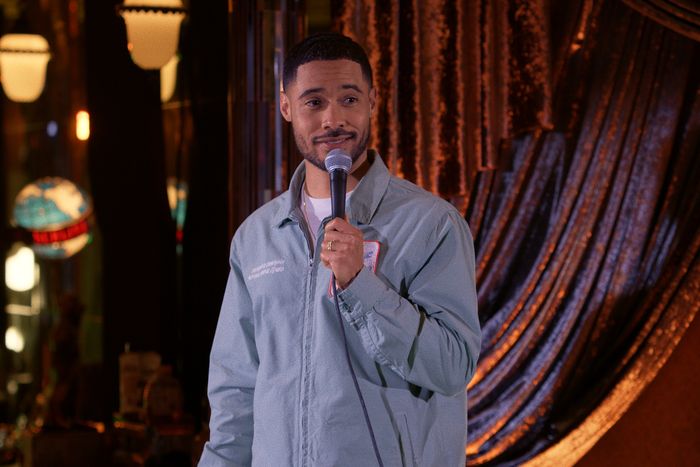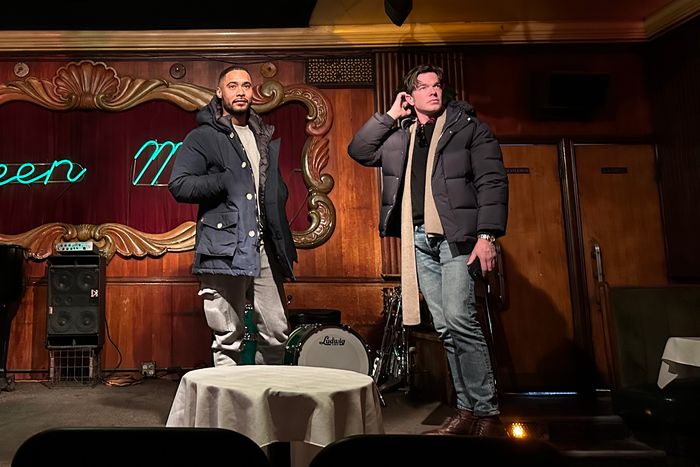
One of the best bits in Langston Kerman’s new Netflix special, Bad Poetry, centers on an interaction Kerman had with a disrespectful student during his years as a high-school teacher. In it, he acts out the student’s thought process before she decided, apropos of nothing, to raise her hand mid-lesson to tell him that he could never be a male model because of his “adult acne.” “This motherfucker got too much confidence,” he impersonates her with pitch-perfect teen-girl sass. “His skin is terrible. He look like multigrain. I’m gon’ tell him. I’m gon’ tell him he look like bread.” If you squint, it shares some creative DNA with a classic John Mulaney bit from his 2011 special New in Town, where the comedian imagines an eighth-grader lasering in on his insecurities: “Look at that high-waisted man! He got feminine hips!” Given their shared comic sensibility, it’s unsurprising that the two stand-ups have established a collaborative kinship. Kerman wrote and performed on Mulaney’s live talk-show spectacular Everybody’s in L.A. earlier this year, and Mulaney produced and directed Bad Poetry.
Filmed at the Green Mill in Chicago, Bad Poetry is a stellar introduction to Kerman’s whimsical brand of comedy, if not an introduction to the comic himself. (Audiences may be familiar with him from his guest role on HBO’s Insecure, his 2018 Comedy Central half-hour special, or co-creating and co-starring in the Peacock sitcom Bust Down.) Broadly, it uses big questions about the joys and responsibilities of fatherhood as an excuse for gratifying tangents about everything from “people who draw Lion King characters with human titties” to the time his mother married a down-on-his-luck sports mascot. Mulaney, upon seeing the hour, was so impressed by its strength that he felt inspired to take on the challenge of directing a stand-up special for the first time. “The reason to film it was because it was so good,” says Mulaney. “As opposed to someone just saying, ‘I need to or want to make another special.’”
John, I was watching your Governors Awards monologue from earlier this year, and you have a joke in it about Terrence Howard’s “new geometry.” And Langston, you did a sketch on Everybody’s in L.A. where you played Terrence Howard. I wanted to ask: How much of your personal and professional relationship do the two of you spend talking about Terrence Howard?
Langston Kerman: I’d say a fair amount.
John Mulaney: A fair amount.
L.K.: John is very good at encouraging everybody that writes for the show to write what we are excited about and want to see in the world, and in a beautiful way, he and I share a lot of commonality in our appreciation for Terrence Howard and all that he’s doing with mathematics. But that pitch actually started with me hoping to go into a real Los Angeles classroom and teach “new math” to real L.A. students. And then John was like, “Hey, man, no, we can’t do that.” And we worked our way backwards to where it landed.
You’re a former professional teacher, so you’d think that might have made it easier to pull off.
L.K.: That was my hope. I think there’s a lot of legality, and also it’s a very expensive ask to go into a real classroom to do that.
J.M.: Langston is like Tim Walz: He’s proudest of being a teacher. And, like Tim Walz, he believes in the math of Terrence Howard.
L.K.: It’s why Kamala got my vote. She brought in that new guy, and I get it now.
J.M.: Most tickets are “one plus one equals two,” but that makes no sense.
What do the two of you remember about meeting each other for the first time and starting to work together?
J.M.: Langston, I don’t know if we ever met before Bust Down.
L.K.: I met you one time at Largo. But we did not meet in any real capacity until Bust Down came out. And you were just very sweet and kind about all the stuff you liked about it.
J.M.: Bust Down was and is a perfect ensemble comedy. It was the funniest show I’d seen since Always Sunny. The writing, the four of them — so good. I heard that you guys were trying to find out if you were going to come back for a second season, and this is very embarrassing, but I will admit this on the record: I reached out to the Bust Down gang, and I was like, “I’m a huge fan. If you ever need me for anything on the show, I would love to do it.” And in my head, I was like, I’m going to be like the Danny DeVito to their Always Sunny. I was like, “If you’re ever looking for someone to help produce and be on-camera, I humbly say I’m a huge fan.” Then all four of them, in different ways, were like, “Oh, cool, man. Glad you like the show.” Langston wrote, “We’re still trying to see if it comes back,” but Sam Jay and Jak Knight and Chris Redd were like, “That means a lot! Thank you. Bye.”
L.K.: I think what John had not realized is that Peacock was being very clear that they were not excited to bring the show back, and we were sort of trying to save face in front of our hero, more than trying to shame him for reaching out. I think John mentioned in that email that he was starting a production company, right?
J.M.: I did. I was just going to fucking Brian Epstein the Bust Down four. I remember, that summer, I was sitting there going, That’s what I’m going to do next.
L.K.: You have no idea how excited we would have been to have you.
J.M.: I should have been more direct.
L.K.: This is a lesson for everybody: Say what you want.
J.M.: A lesson for everybody: If you want to be on Bust Down, you have to be clear with the four of them.
John, what was it about seeing Langston’s hour that made you want to direct a stand-up special for the first time?
J.M.: Not to sound conceited or big-brother-y, but it very much reminded me of this special I did in 2011, New in Town. I was like, Langston is really sought after as a writer and actor as well, and everyone knows he’s a good stand-up, but he’s got a great hour that’s got to get out. And what I felt when I recorded my special was, This is everything since I started stand-up. These are the types of bits that I’ve been trying to nail, and now I have a whole row of them, and they add up to an hour, and I want to do this right now.
Every bit of this special is a take-home bit. I always think of specials like album tracks, and each of these is a hit to me. My main critique of most specials is — and I always try to be extremely hard on myself too, and I’m open to criticism if people think otherwise — every part of it has to be good! Just wait if you don’t have it! This hour was so tight and ready to go. The reason to film it was because it was so good, as opposed to someone just saying, “I need to or want to make another special.”
When you were initially talking about visualizing the special, what did those conversations look like?
J.M.: I care so much about how specials look and, no matter how they look, I really like when they have a visual notion behind them. And Langston, you had what I respected so much: You came with such a clear reference point of a movie that no one has seen or talked about in some time.
L.K.: I really wanted the movie Love Jones to be the root for what we were building, and I think a lot of the choices, including a poem that the opener, Mandal, read before the special that didn’t make the cut for various reasons—
J.M: Legal! The No. 1 reason was legal.
L.K.: But, yeah, I was really inspired by Love Jones. And then that space, the Green Mill —
J.M.: To casually throw it out still delights me. “So, Love Jones …”
Remember that movie The Cutting Edge about figure skating? Or Rad to BMX biking? Or Gleaming the Cube to skateboarding? Love Jones is that to mid-’90s slam poetry.
L.K.: Yeah, it probably lives somewhere in that space. Just a certain, specific group of older, horny Black women are really excited about it.
J.M.: We had a poem at the top of the show that Langston had scripted and Mandal performed, and I thought, That’s so beautiful. I knew Langston was a poet, and I thought, It’s cool that he wrote kind of a dogshit poem, but believably. It was a believably annoying poem. So then we got into the edit and I said, “You might want to publish that as your own poem before it goes in.” And he goes, “Well, it’s not my own poem. It’s from Love Jones.” And I went, “The whole poem is word-for-word from Love Jones?” And he went, “Yeah, I told you Love Jones was the visual touchstone. Did you ever watch Love Jones?” And I said, “No, but I looked at photos of it.”
L.K.: “Yeah, I looked at some dark images that you sent me. I glanced at it on my phone and then I looked at other stuff on my phone.”
J.M.: Then Langston’s own wack-ass poetry background came into play when choosing the venue.
L.K.: Yeah, the Green Mill is this iconic space for poetry in Chicago. Legend has it that it’s where slam poetry was invented by this dude Marc Smith, who basically was tricking a bunch of drunks at a bar to rate his poems from one to ten in order to make them pay attention. They were drunk, and they didn’t give a fuck when he read his poems, but if he got them to make it a competition, suddenly it became this iconic moment of inventing slam poetry.
Langston, does your poetry background inform your comedy writing at all?
L.K.: I often say that poetry and comedy come from the same sort of touch point as an art form. They’re both just taking a narrative and making it hyperbolic. One’s fun, and the other one’s sad and about my dad. And I think poetry, in a nice way, just teaches you to write concisely — to take as much of that story and shrink it down to the smallest words possible. And I think that definitely is helpful in comedy. The less rambly and obnoxious I can make it, the better it tends to be. It helps! But none of my poems were funny, and I won’t be sharing them.
Are there any tropes of specials that you wanted to avoid when putting the special together? Anything you definitely didn’t want it to look like?
L.K.: John and I — I think I can say this — have a private hate for a lot of stuff that people do, and we’ve agreed on a lot of the things we see in other specials that are sort of icky. So we talked a lot about stylistic choices, including not making it about the audience. We didn’t need cameras pointed at the audience to prove this thing was funny. John was really smart to make sure that the space didn’t just stay flat the way that it was, and about trying to find little, small things to make it feel more grand and sexy than it was, even though the Green Mill is a gorgeous space on its own. We wanted it to look cool and not like a silly thing that other people are doing.
J.M.: Yeah, if I named any of the things we’d avoided, you could go find what specials I’m probably talking about, so I won’t do that.
Langston, there’s a recurring bit in the special where you talk about managing your mother-in-law’s dating profile. I wanted to ask how that works. When you’re talking to these men, at what point do you hand it over to your mother-in-law and say, “All right, I vetted this man for you. You’re good to go”?
L.K.: My wife and I would spend about a day just small-talking with these gentlemen: “How are you?” “What are you up to today?” We’d ask all the basic getting-to-know-you stuff to see if they were capable of basic conversation, which is kind of all you can ask from a 60-year-old man on the internet. And then, at the point where they seem even remotely capable, we would screenshot our conversation, as well as their profile, and send it to her along with their phone number and be like, “Call Joseph today at this time, as you’ve agreed to in this email.” And then she would call, and she’d report back on whether or not she enjoyed that conversation. And you bet your bottom dollar that she never did!
You also tell a story in the special about a day you spent with your friends high on mushrooms at the park. I know you’re friends with Sam Jay, who also has a story in her last special about doing mushrooms with her friends at the park. Are both stories about the same day?
L.K.: Same day! Sam got really excited about watching the white people dance, because they had set up a DJ booth randomly, and then it became this weird war between them and these other people who were trying to have a baby shower, who were very put off by the music. And she was getting very angry at the fact that these white people, who had finally found their freedom dancing peacefully in the park, were being told by a richer class of people that they needed to shut it down, and that became the inspiration for her story. Then after Sam sat there watching this war happen for an hour and a half, we wandered to the ballpark, and I lost my mind watching a man play softball poorly. It was great!
While I have you both here, I’d be remiss if I didn’t ask about the possibility of more episodes of Everybody’s in L.A.
J.M.: I think we’d like to figure out how to do more. It was a very interesting experiment in this confined amount of time. Definitely open to it. We had lots of bits we didn’t get to.
L.K.: Hell yeah. I’m into it. But I’m not in charge of that.
Langston, you wrote for the Oscars in 2016. Do you happen to know any friends in comedy who are the subject of widespread speculation about whether they will one day host the Oscars?
L.K.: [Laughs.] What do you want me to do? You want me to nudge him?
Yeah, can you help me peer-pressure him into hosting the Oscars right now?
L.K.: Listen, I did not get a single joke on in 2016. Chris [Rock] hated everything I offered him, and I respect that choice! He was doing the right thing for him. And John hosts a lot of cool stuff, and I’m sure he’ll figure it out if that’s what he wants to do.
J.M.: I think I’m not hosting! I said “No.” People are telling me I’m not. Yeah, I’m not doing that.



